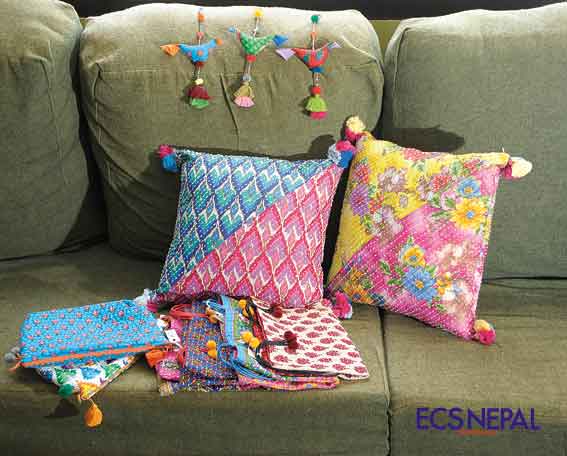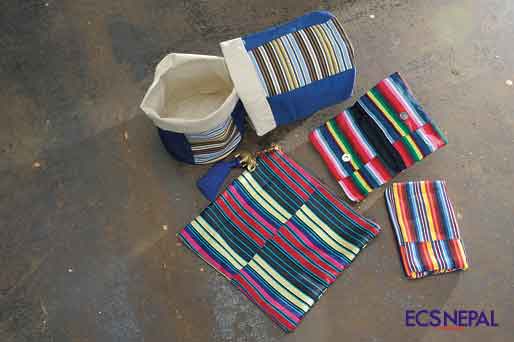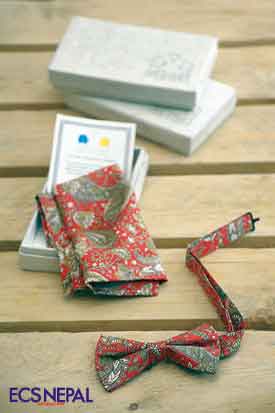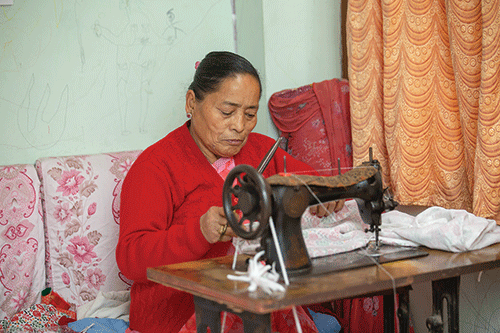Collaboration and cooperation can get one further faster, and that’s what Timro Concept Store is all about.
Only two months old, Timro Concept Store at Jhamsikhel has been making waves on the social media. The store is a place where passion and love for Nepali handmade products and Nepali tea and lifestyle come together in a total experience. Started as a partnership between Mr. Yogen Tamrakar and Mr. Dipen Lakhe, the store has a unique "shop in shop" concept that collaborates with young designers and Nepali brands and provides them the chance to display and sell their products in a mini warehouse frame. The comfortable couch setting, where you can enjoy their homemade lemonades and bakery goods with a friend or two is the cherry on the cake.
So, where did all of this start from? Yogen’s wife, Anouk, who is originally from Netherlands and has an art background, seems to be at the forefront. She shares how she's passionate about interior designing and handicrafts, and says, “I always had this idea of opening a shop where you have a total experience of everything, but along with that, I thought this should be about Nepal, the new generation, and about pushing the 'designed and made in Nepal' aspect.”Already involved in small scale production here, she was familiar with many events, such as the Art Market, where she met numerous Nepali designers and production houses. "We see all these budding designers and gorgeous products at these markets and events, but where are they the rest of the year? After these events, where do you get the products? And, that's why we came up with the idea of a place where we promote different designers and brands, who can just drop in and put their products on display."

Coming together
Most of the designers featured here are Nepalis, along with a few ex pats and foreigners. But, what is more important for the store is that the products be made in Nepal, be manufactured in a safe environment, and be supportive of Nepali handicrafts. When choosing products, they try not to include the same kind of items, and the store, with its different products from unique brands, shows that. Anouk explains the procedure of acquiring the products, "First, I ask the story behind the products and their origin. We also try to visit the production center and bring some samples. If it's something that we don’t already have and fits in the shop, we find ways to work together with the designer or brand."
One of the store's concerns is affordability, as their target is not just one group of people, which is why the prices range widely from Rs.25 to Rs.20, 000. They want the store to be open to students and other youngsters, and not limited to just affluent Nepalis and tourists. Even the Nepali coffee and tea and lemonades and homemade bakery items in the café are reasonably priced so as to make them affordable for everyone. "And it's working out great! We have a lot of Nepali youngsters stopping by during the weekdays. I am really happy that they do not think of us as a luxury shop. Even though we do have some alluring luxury products, we try to make most of the things affordable for everyone," declares Anouk. She believes that, in Nepal, the gap between luxurious and affordable is widened to such an extent that affordable becomes almost symbolic of bad quality."We are trying to fill the gap," she remarks.
Timro Concept Store’s products are made in collaboration with talented designers and brands from Nepal. Anouk understands that the problem is not the lack of good designers, or the inability to manufacture, but the difficulty of setting up all by oneself. It's almost impossible to manage designing and production and sales and marketing on your own. "Besides, the rents in Kathmandu are sky rocketing,” she adds. “Then, how can a designer who's just starting up afford a place in a good area to sell the products?"So, that’s how they came up with the collaboration system with 'shop in shop' theme. “At the end of the month, we have payment exchange. Most of the profits still go to the brands," she informs. In addition to a spot in their shop, they also support the brands with a full page on the store website, and promotions on Facebook and Instagram.

Bringing back the smiles
One of the brands featured here is Muskan—Bringing Back Smiles, which specializes in hand stitched products. The smile (muskan) of a woman is priceless, and this smile means so much when the very basic idea of personal choice and economic freedom is a far-fetched dream for most Nepali women. Muskan approaches women groups in bahals, and provides them with trainings for sewing and knitting. They then join hands with them to engage them in producing a range of hand stitched products —cushion covers, tote bags, pouches, cotton dresses, pompoms and earrings.
Although Muskan started as a college project of creating a business model as part of a social entrepreneurship course for Anisha Shakya and her friends, it is slowly extending itself to a wider reach of home-based working women, and making it possible for them to gain economic independence. About collaborating with Timro Concept Store, she says, "A great place for creative and emerging entrepreneurs, it provides a storefront and a healthy community for startups like us, who make socially-conscious handmade products and are looking to network and collaborate. Beautifully showcasing locally made products with a 'mix-and-match' theme, the store has inspired us to bring out our best."
Creating new entrepreneurs
A similar non-profit organization producing and showcasing socially cognizant handcrafted product, is HattiHatti. Empowering women from marginalized communities in Nepal through education and practical training, women get the chance to become skilled tailors, creative entrepreneurs, and independent individuals. Through its education programs, HattiHatti makes sure that these women get proper education, which includes classes in entrepreneurship, English, and mathematics. Additionally, they are provided with a safe and creative platform to form bonds of friendship and business contacts.
Along with its exclusive concept of collecting and recycling old colorful sarees to make vibrant bowties, kimonos, and dresses, the organization has a vision of enabling women to use knowledge from their programs to start up their own sustainable tailoring businesses. Sunaina Singh Shrestha, the project coordinator says, "By providing these women with education as students, they will eventually become teachers to other women in need. We work for women rights, to enable them to become independent individuals, so as to create a more equal society."

Love thyself first
"Treasure yourself" is Tissah's tagline. At the core of Tissah’s brand is the desire for women to know their value, not only to society, but also to themselves. While culture teaches women many things, learning to love themselves is almost always at the bottom of the list. Tissah, which literally translates to jewelry in Newari, creates space for women to learn to treasure themselves with their range of intricately crafted jewelry pieces and leather purses. One of their pieces is the necklace ‘Maya’. Transcribed from the ancient eleventh century Ranjana script, this gold-plated necklace is designed with the mirror image of the word 'Maya', which means love in Nepali. The mirror image depicts that love reflects love, i.e. the love you give is the love you get. With their timeless pieces, Tissah strives to showcase the value, supplement the story, and share the spirit of being a woman.
Another brand celebrating the essence of womanhood is Saree||Sarong, as it commemorates the traditions of unique and colorful dresses of women all over the world. Collected during travels, the fabrics used have been hand-picked from vintage collections, or vibrant local markets. The products use colorful striped aprons from Tibet, vintage kimonos from Tokyo, batik sarongs from Bali, bold patterned kanga cloth from Africa, silk ikat from Uzbekistan, and traditional dhaka and haku patasi from Nepal. These traditional fabrics are combined to produce premium purses, bags, accessories, and pillows.
Growing together
Although Timro Concept Store started off with five designers, they now have twenty different Nepal-based brands collaborating with them, plus a waiting list. Anouk claims that she no longer needs to contact designers nowadays, but rather, they read something about it on the newspapers or come across posts on Instagram, drop by, and ask if they can join in. For a lot of Nepali designers, production places, and women vocation centers, the store provides a place to begin, to meet people, and expand their business. Although the store believes in supporting the local market, they are also open to exporting their products to create a big network. Not only a network with buyers, but also a network for collaborations, as different designers work in partnership with producers associated with the store. "It’s a big web of different ideas and people, which expands beyond the store," she says.

Yet, it is not just about designers or network of people, they have a bigger picture in mind, and that is to encourage Nepali youngsters to stay in Nepal and build the country together for the next generation. A lot of Nepali youngsters have incredible ideas, but only need a push and some support to help take off, and Timro Concept Store does just that. Anisha says,"Our main income is through sales. Organized only once a month, the Art Market doesn’t help us grow, and we do not have enough capital for our own outlet, either." Adds Sunaina, “Timro Concept Store provides a great platform for budding organizations like us to grow, for whom to open our own outlet would have been a financial misery. It has also helped promote our recognition internationally. Also, many craftsmen go to Dubai, Saudi Arabia, and other countries to work. With the store, work opportunities for skilful Nepali craftsmen have been created, as well.”
Besides the job opportunities, what is really important to them is to save the Nepali identity. Even though Nepal is known for its handicrafts, the prevalent mentality is that, international goods are of a more superior quality. "It's absurd that we have products that are labeled ‘export quality’ and ‘Nepali quality’,"comments Anouk. Yet, she feels that Nepal is really ready for the handicraft industry to boom, and hopes that, to establish respect for Nepali handicrafts, ‘export quality’ products will be readily available in the local market in the near future.
Till then, come visit Timro Concept Store and enjoy a cup of Nepali tea or coffee with one of their homemade bakery items, or go for an amazing cream cheese bagel with their refreshing lemonades (I tried the lemonade, and it's one of the best ones out there). Or, have a look at their exclusive range of products and add some of them to your collection. After all, you can't buy love, but you can buy handmade, and that is kind of the same thing.










